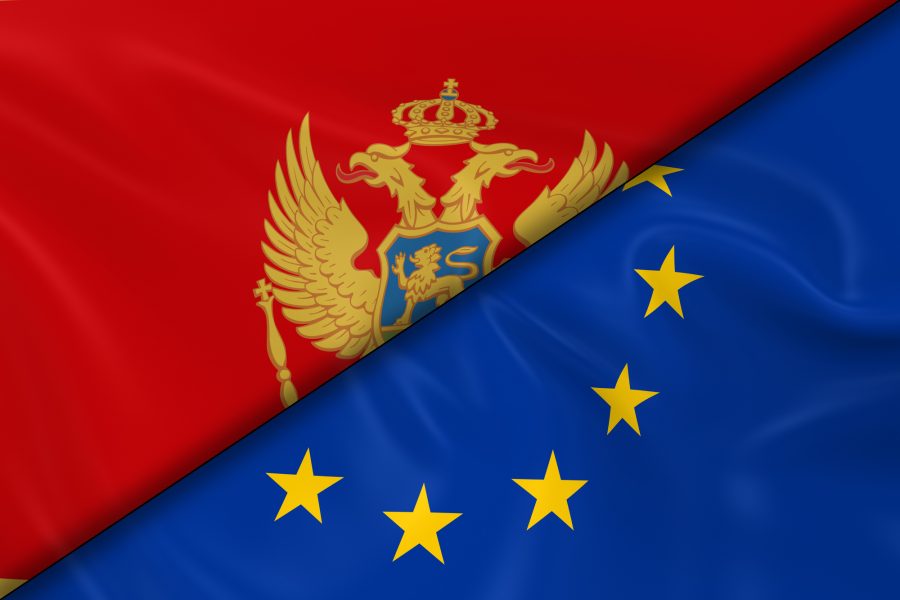Montenegro applied for EU membership in December 2008, and its Stabilisation and Association Agreement, the legal foundation for relations with the EU, entered in force in 2010. Montenegro is in a leading position on its path towards EU accession, compared to the other five aspirants from the Western Balkans.
In 2012, Montenegro became the first country from the six current Western Balkan candidates and potential candidates for EU membership to start accession negotiations with the EU. With most negotiation chapters open and a likely candidate to meet the 2025 accession date suggested by the European Commission’s new 2018 enlargement strategy.
Within the framework of the accession negotiations as of May 2019, 32 chapters, including chapters 23 and 24 on the rule of law, had been opened, three chapters of which, i.e. science and research, education and culture and external relations, have been provisionally closed. Montenegro is participating in the Stabilisation and Association Process. Overall, Montenegro continued to broadly implement its obligations under the Stabilisation and Association Agreement (SAA).
Montenegro still needs a lot of work to do on judicial system, fight against corruption, organized crime, freedom of expression, before becoming full EU member state.
Timeline
- June 2003: The EU-Western Balkans Thessaloniki Summit confirms the EU perspective for the Western Balkans.
- June 2006: The EU decides to establish relations with Montenegro as a sovereign and independent state.
- October 2007: The EU-Montenegro Stabilisation and Association Agreement is signed.
- December 2008: Montenegro presents its application for membership to the EU.
- December 2009: Visa-free travel to Schengen area for citizens of Montenegro.
- May 2010: The Stabilisation and Association Agreement enters into force.
- November 2010: The European Commission issues its Opinion on Montenegro’s application for EU membership.
- December 2010: The European Council grants candidate status to Montenegro.
- June 2012: The accession negotiations are formally opened at the first Intergovernmental Conference.
- June 2013: The screening meetings are completed.
- December 2013: ‘Rule of Law’ chapters 23 and 24 are opened, along with three other chapters.
- February 2018: The European Commission adopts its strategy for ‘A credible enlargement perspective for and enhanced EU engagement with the Western Balkans’.
- May 2018: The EU-Western Balkans Sofia Summit confirms the European perspective of the region and sets out a number of concrete actions to strengthen cooperation in the areas of connectivity, security and the rule of law.
- By May 2019, 32 out of 35 chapters have been opened, three of which are provisionally closed.
Schengen Area
Visa liberalisation for citizens of Montenegro travelling to the Schengen area has been in force since December 2009. As part of the monitoring mechanism in place since visa liberalisation, the Commission has been regularly assessing the progress made by the country in implementing reforms introduced under the visa roadmap. The monitoring mechanism also includes an alert mechanism to prevent abuses, coordinated by the European Border and Coast Guard Agency. The Commission has regularly submitted its post-visa liberalisation monitoring reports to the European Parliament and the Council. A readmission agreement between the European Union and Montenegro has been in force since 2008.
In 2018, Montenegro passed a Draft Law Amending the Law on Border Control. The passing of the Law is primarily necessary for the harmonisation of border control tasks with the legal acquis of European legislation, bearing in mind that Montenegro is one of the candidates for EU membership and that after joining the European Union, it will be part of the Schengen area.
EU legislation
Important work on alignment and preparation for the implementation of the acquis has taken place in most areas. The country has reached a good level of preparation in areas such as company law, intellectual property law, energy, and foreign, security and defence policy. It is moderately prepared in many chapters, such as free movement of goods, competition policy, agriculture and rural development, food safety, veterinary and phytosanitary policy, as well as enterprise and industrial policy. Montenegro is at some level of preparation in the areas such as environment and climate change, and social policy and employment. Good progress has been made in the areas of right of establishment and freedom to provide services, intellectual property law, agriculture and rural development, and food safety, veterinary and phytosanitary policy. Looking ahead, Montenegro should focus in particular on competition policy, environment and climate change, as well as public procurement. Strengthening the administrative capacity for ensuring the application of the acquis remains an important challenge for Montenegro.
Montenegro has continued to align with all EU common foreign and security policy positions and declarations.
EU assistance
Montenegro is currently benefiting from EU financial assistance under the Instrument for Pre-accession Assistance (IPA) with an indicative allocation of EUR 279.5 million for the period 2014-2020
The 2018 action programme provided EUR 28.2 million for reforms and investments in the area of the rule of law and fundamental rights, agriculture and rural development. In 2018, Montenegro benefited from additional EUR 8 million, following the performance reward exercise undertaken in the framework of the mid-term review of the Indicative Strategy Paper.
Montenegro continues to benefit from participation in the following EU programmes, with IPA support: Erasmus+, Creative Europe (Culture and Media strands), Employment and Social Innovation, Horizon 2020, Customs 2020, Fiscalis 2020, Competitiveness of Enterprises and Small and Medium-Sized Enterprises Programme (COSME). Montenegro also participates with own funds in the EU Justice Programme.
The latest 2019 EU report on accession of Montenegro is available here





